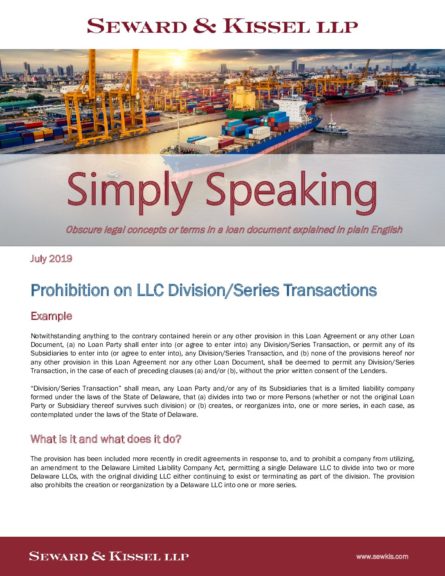
Prohibition on LLC Division/Series Transactions
Example
Notwithstanding anything to the contrary contained herein or any other provision in this Loan Agreement or any other Loan Document, (a) no Loan Party shall enter into (or agree to enter into) any Division/Series Transaction, or permit any of its Subsidiaries to enter into (or agree to enter into), any Division/Series Transaction, and (b) none of the provisions hereof nor any other provision in this Loan Agreement nor any other Loan Document, shall be deemed to permit any Division/Series Transaction, in the case of each of preceding clauses (a) and/or (b), without the prior written consent of the Lenders.
“Division/Series Transaction” shall mean, any Loan Party and/or any of its Subsidiaries that is a limited liability company formed under the laws of the State of Delaware, that (a) divides into two or more Persons (whether or not the original Loan Party or Subsidiary thereof survives such division) or (b) creates, or reorganizes into, one or more series, in each case, as contemplated under the laws of the State of Delaware.
What is it and what does it do?
The provision has been included more recently in credit agreements in response to, and to prohibit a company from utilizing, an amendment to the Delaware Limited Liability Company Act, permitting a single Delaware LLC to divide into two or more Delaware LLCs, with the original dividing LLC either continuing to exist or terminating as part of the division. The provision also prohibits the creation or reorganization by a Delaware LLC into one or more series.
Why is it there?
Most credit agreements and/or other loan documents contain covenant restrictions relating to mergers, asset sales and similar such transactions, but do not expressly contemplate a division of an LLC. This covenant addresses that potential shortcoming and gives creditors a say in the proposed division and enables lenders to protect their collateral which may be compromised as a consequence of the division.
Why is it important (or not so important) to Lender?
A Delaware LLC can, under a plan of division, allocate its assets, property, rights, series, debts, liabilities and duties among newly created LLCs or series and then terminate or continue its own existence. Following any such division, each resulting Delaware LLC could own the assets and be obligated on the liabilities of the original Delaware LLC to the extent allocated to it (unless the plan of division is deemed a fraudulent transfer, which is inherently difficult to prove) with the consequence that a lender may find that its collateral may become the property of a non-debtor, and have no legal remedies against any such newly created LLC. A Delaware LLC may also be divided into series with each series having assets associated with it that are not associated with other series in such Delaware LLC. This provides for internal asset segregation. As a result, one series within the Delaware LLC may be insulated from the debts and liabilities of all other series of such Delaware LLC.
How does it affect Borrower in practical terms?
As a practical matter, a borrower will need to present its plan of division to the lender and obtain the lender’s prior consent. This could also include requiring any newly created LLC’s to be added as a guarantor or pledgor under such loan documents.
How is it relevant to shipping?
This provision is increasingly prevalent in shipping loan agreements but equally in non-shipping related loan agreements involving borrowers or guarantors that are structured as limited liability companies under Delaware law. Many SPV’s owning U.S.-flagged vessels are entities formed in Delaware.
How is it negotiated?
Either all lender consent is required permitting the division of the LLC pursuant to a plan of division approved by the lender group, or the division is permitted provided that any newly created LLC arising as a result of such division is added as a guarantor or pledgor under the applicable loan documents.
Questions?
Please contact any member of S&K’s Maritime Practice Team.
